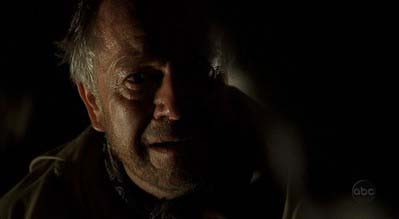A few years ago, a pal helped me out; I was in a bind and needed someone to read an episode summary for my podcast Looking Back At Lost, and he helped me out. He didn't watch Lost, and as I sent off the text of the summary, I wondered what it must be like to suddenly read about flashbacks and the hatch and tailies and Mr. Eko and computers and buttons and timers with 108 minutes. As can hear (either here or here), he did a great job. (Sure, at one moment of frustration with all the plot particulars, he cursed and denounced the show... but hey.)
However, as I prepared next week's podcast for "Everyone Hates Hugo," I was struck by how serialized television is absolutely remarkable. Had JPR, or any other Lost newbie watched it, the episode would have been coherent enough. (Indeed, I was irked that the script included plain-jane exposition moments like "So that hatch has a button that needs pushing every 108 minutes?" Such dialogue is there to be kind to new viewers.)
It's the ending that would go over the head of any new viewer--perhaps the best ending of any Lost episode, save the finale. It's the ending that speaks to a pure, elemental truth while holding up a mirror to ugly corners of the audience's mind.
Lost had 121 episodes, but into the very first one, about 20 minutes in, we are introduced to the character of Rose. On the plane, she's a mildly nervous flyer, concerned about her husband who has gone to use the bathroom towards the tail. After the crash, she is inward, serene, and calm. She says, in the course of the two hour first episode, that she isn't mourning the loss of her husband because he isn't dead. She is told that she is being unrealistic, that she is in shock. Now, even if you haven't watched a minute of Lost, you can probably guess the obvious authorial twist: her husband, Bernard, indeed is not dead.
But in the magnificence of the long form of television, we could only predict that, and only while juggling more prominent story elements, both mysterious and up-front. This long form of television is something that, I fear, gets missed out on when one suddenly has an entire show available to them, be it on DVD, Blu-Ray, or online. With any dramatic presentation, time must go on in between the episodes. It's something that the British, with their under-funded television system, miss out on. Oh, they're so impressed with six consectutive weeks of 30 minute episodes of The Office! That's a blink of an eye, and why the American version was able to slowly, savoringly brew the bond between Pam and Jim.
The effect is doubled, almost literally, with an American network drama like Lost, with 20+ episodes per season (for its first three seasons, anyway). To have Rose stubbornly declare that her husband isn't dead in September is character shading; for her to repeat it again in the winter of our viewing is keeping up with a recurring "guest" character. To then return to it a full year after she first looked back on the plane, hoping her husband would return to his seat soon is masterful.
And so that masterful moment, incubated for a year in original-viewing time, or at the very least matured across 25 or so episodes, was brought to fruition. Some of our main castatways had been on a raft, and ultimately washed ashore on another part of the island, found by mysterious folks. For an episode or two the show teased us, but we were told that those folks were from the tail section. At that point, naturally, it was only a matter of time before Bernard, Rose's husband, stepped to the forefront.
Yet the show went one step further: not only speaking to the bonds of love, but shaming the audience in the process. The small contingent of those on the raft, with some of the tail section folks, go back to the meager home base of the latter.
A white man approaches our castaways. He asks, "Back where you guys, uh, where you came from -- is there a woman named Rose there?"
The hushed response from one of our heroes: "Black chick in her 50's?"
The white man asks, his voice hushed, "Is she okay?" He's told that she is alive and well. He thanks them, adding, "I'm--I'm Bernard."
To have seen this love from afar develop over a year's worth of episodes is one of the great feats of television; for us to realize, with our meager views, that we always imagined Rose's husband to be a black man shames us and reminds us about the basic, human messages that can be contained by the long form of television.

No comments:
Post a Comment